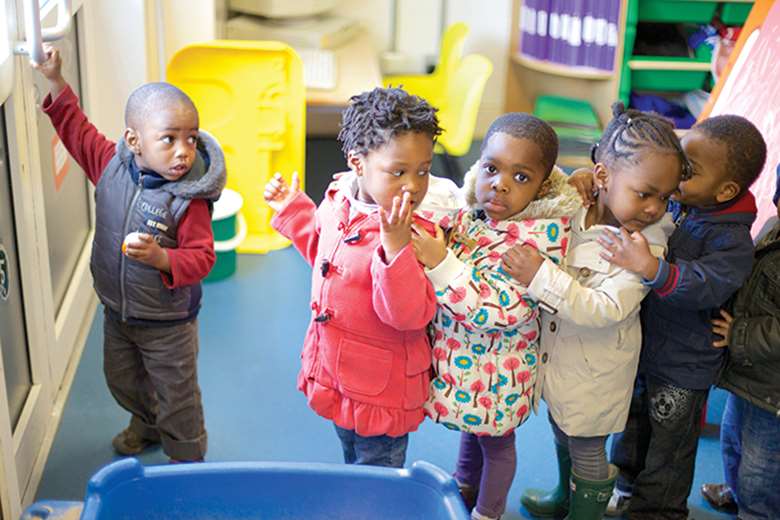Gaywood First Steps
Emily Rogers
Wednesday, July 26, 2017
Children's school readiness needed to improve at a Kings Lynn early years setting

- One of nine Kings Lynn early years settings helped by Action for Children's Vancouver Children's Centre to partner with teachers to improve school readiness
- Through annual "speed-dating" events, staff share information with teachers that can ease children's transition to school
- The percentage of children leaving reception with a "good" level of development at schools served by the children's centre has improved over the past year
ACTION
When Louise Young joined Gaywood First Steps nursery as manager early last year, she quickly spotted that children's school readiness needed to improve. "It was the lack of independence; simple things like being able to put their own coats and shoes on," she recalls.
The 86-child nursery serves a deprived area and a 2014 Ofsted inspection said it needed to strengthen home learning. Young knew stronger partnerships were needed with parents and schools and found an enthusiastic partner in the Action for Children-run Vancouver Children's Centre. Its family practitioner Nicky Crown views school transition as an "area of weakness" that she is well-placed to help with, being "in the middle" of nurseries and schools.
"I hear teachers saying: ‘it's really difficult sometimes; children suddenly appear on our register and we've no idea whether they've been to an early years setting'," she explains. "Some schools are fed from a lot of nurseries; possibly 20 different settings, so it's impossible for teachers to visit every setting to see every child. I thought about what we could do to get schools and early years settings talking to each other."
Crown's inspiration was to hold a transition event based on the concept of speed dating. Starting last summer and repeated this June, it involves reception teachers and assistants from Vancouver's eight cluster area primaries sitting in a circle and staff from Gaywood and other nurseries moving round them, spending 20 minutes with each "date". Early years staff present a report for each child joining their date's school in September, showing progress against the Early Years Foundation Stage curriculum areas. They also share details of additional needs, action plans in place, family issues, or any fears that Crown says could "completely throw" a child starting school, such as crowded rooms. "If I haven't got any children joining a school, it's a good time to build a relationship, in readiness for the next cohort," explains Young. "We can ask what they're looking for and about their teaching methods and style." Schools then arrange transition meetings with Gaywood staff for children needing additional support. Teachers visit them and their parents at nursery, building relationships and agreeing how the child can be supported to ease the transition.
The summer speed-dating follows a transition process at Gaywood starting with an assessment of each child just before Christmas, followed by a meeting to establish the EYFS areas needing the most attention. Parents now play a much bigger role in this, through surveys and parents' evenings in January and after Easter, where they agree strategies at home and nursery.
Young has initiated a stronger focus on developing children's independence, which Crown says is high on schools' wishlist for new entrants. "What schools really want to know is: are children able to put their shoes on, go to the toilet by themselves, and get themselves dressed and undressed? Often teachers say PE lessons aren't PE lessons; for a half-hour lesson, children spend 20 minutes getting undressed, five minutes in the hall, then 15 minutes getting dressed again." So Gaywood operates an "independence checklist" for each child; enabling him or her to self-assess skills such as putting on coats, through smiley or sad faces. Young has also introduced a snack bar, building children's skills in serving themselves and "group time", preparing them for working in groups at school. Story sacks of books and related activities have been introduced for home use.
Crown plans to extend the speed dating to two other children's centre clusters next year.
IMPACT
Young has seen an increase in staff confidence in asking teachers about their expectations of children and how they can best support them, adding that children have become "much more independent". She says Gaywood's work with parents has sparked the biggest improvement journey. "They've started talking to us, much more than last year, about their children's development, building knowledge of what's expected of them and how we're supporting them."
Crown says the speed dating is proving a conduit of vital information, helping schools better prepare for meeting children's needs. One teacher said she did not know a child joining last September had an education, health and care plan until hearing this during the event.
Initial data collated by Norfolk County Council shows 71.5 per cent of children leaving reception at schools in Vancouver's cluster area achieving a "good" level of development in the Early Years Foundation Stage Profile this summer, increasing from 70.3 last year. Last year's national average was 69.3.




